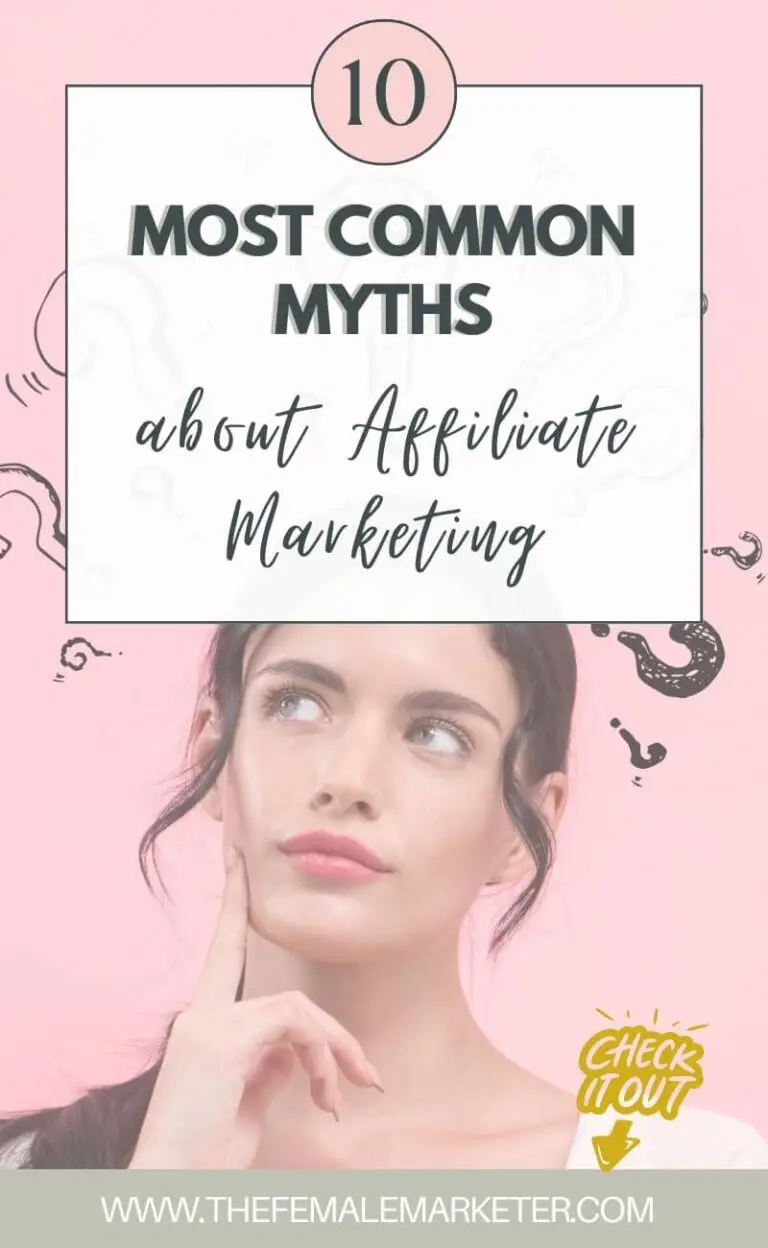Hey there, lovely entrepreneur! If you’ve ever felt drawn to the idea of Affiliate Marketing but found yourself hesitating because of all the rumous and myths floating around, you’re not alone.
Let’s face it, the online world can be a maze of misconceptions and misinformation, especially when it comes to making money online.
In my blog post, I’m going debunk the top 10 myths that unfortunately often cloud the reality of Affiliate Marketing. We’re talking about those persistent rumors that say you can make a fortune overnight or that Affiliate Marketing is only for the tech-savvy and social media influencers.
So, if you’ve ever felt skeptical or unsure about starting with Affiliate Marketing, grab a cup of tea, cozy up, and let’s debunk these myths. We’ll separate fact from fiction and even show you a few examples of successful affiliate marketers who defy these myths.
Disclaimer: I include affiliate links in my articles. Clicking on these links and making a purchase might earn me a commission without any additional cost to you. I value transparency—find more details in my Affiliate Disclaimer.
1. Affiliate Marketing is a Get-Rich-Quick Scheme
One of the most common misconceptions about Affiliate Marketing is that it is a get-rich-quick scheme. Many people believe that they can start an Affiliate Marketing business and start making money overnight. However, this is FAR from the truth.
Success in Affiliate Marketing requires time, effort, and dedication. Affiliate marketers need to build trust with their audience, create valuable content, and establish themselves as an authority in their niche. This takes time and consistent effort.
There are numerous examples of successful affiliate marketers who did not achieve overnight success. One notable example is Michelle Schroeder-Gardner, the founder of Making Sense of Cents. Michelle started her blog as a side hustle while working a full-time job and initially struggled to make significant income from Affiliate Marketing.
However, through consistent effort, strategic content creation, and building trust with her audience, Michelle grew her affiliate income to over $50,000 per month.
Her success story serves as an inspiration to many aspiring female affiliate marketers, showing that with determination and persistence, long-term success is achievable in the Affiliate Marketing industry.
2. You Need a Huge Following to Succeed in Affiliate Marketing
Another misconception about Affiliate Marketing is that you need a massive following to succeed. While having a large audience can certainly be beneficial, it is not the only path to success.
Niche audiences can be just as valuable as large audiences. In fact, targeting a specific niche allows affiliate marketers to connect with a highly engaged audience who are more likely to convert into customers. By focusing on a specific niche, affiliate marketers can provide tailored recommendations and build trust with their audience.
There are many successful affiliate marketers with small followings who have built profitable businesses. Let me share Meghan’s story as an example. She documented her Affiliate Marketing journey from the beginning on Instagram, starting with zero followers. Now, she has earned almost one million dollars in less than a year. Meghan is one of the most authentic affiliate marketers I know.
3. Affiliate Marketing is Only for Bloggers and Influencers
Many people believe that Affiliate Marketing is only for bloggers and influencers. While it is true that bloggers and influencers often use Affiliate Marketing as a monetisation strategy, anyone can start making money with Affiliate Marketing.
By learning just a few skills, you can begin promoting your affiliate products on YouTube, a podcast, a social media platform, or a blog. Affiliate Marketing is a versatile business model that can be adapted to various online platforms.
There are successful affiliate marketers who are not bloggers or influencers. For example, John Crestani is an affiliate marketer who primarily uses paid advertising to drive traffic to his affiliate offers. He has built a multi-million dollar business through his Affiliate Marketing efforts without relying on blogging or influencer marketing.
4. Affiliate Marketing is Illegal or Unethical
Another misconception about Affiliate Marketing is that it is illegal or unethical. While there are many cases of unethical practices in the industry, Affiliate Marketing itself is a legitimate and ethical business model.
Affiliate Marketing can be done ethically and legally by following certain guidelines. It is important for affiliate marketers to disclose their affiliate relationships and provide honest and unbiased recommendations to their audience. By being transparent and providing value, affiliate marketers can build trust with their audience and maintain their reputation.
There are many examples of ethical and legal Affiliate Marketing practices. Abby is the founder of Just a Girl and Her Blog, a blog where she shares tips and resources on organization, home decor, blogging, and more.
Abby openly discloses her affiliate relationships on her blog and provides valuable content to her audience while promoting products and services that align with her brand and values. She is admired for her authenticity and integrity in the Affiliate Marketing community.
5. Affiliate Marketing is a Passive Income Stream That Requires No Work
One of the biggest misconceptions about Affiliate Marketing is that it is a passive income stream that requires no work. While it is true that Affiliate Marketing can provide passive income once the initial setup is done, maintaining a successful Affiliate Marketing business requires ongoing effort.
Affiliate marketers need to continuously create valuable content, engage with their audience, and stay updated with industry trends. They also need to monitor their affiliate links, track conversions, and optimize their marketing strategies. This requires time and dedication.
There are many successful affiliate marketers who work hard to maintain their income streams. Pat is the founder of Smart Passive Income, a website and podcast where he openly shares his journey in building passive income streams, including through Affiliate Marketing. He consistently creates valuable content for his audience and actively engages with them through his blog and podcast. He is constantly experimenting with new strategies and staying updated with the latest trends in the industry.
6. You Need to Promote Every Product to Make Money in Affiliate Marketing
Another misconception about Affiliate Marketing is that you need to promote every product to make money. However, promoting only relevant products can be more effective in generating sales and building trust with your audience.
By focusing on products that align with your niche and provide value to your audience, you can establish yourself as an authority in your industry. This will make your recommendations more credible and increase the likelihood of conversions.
A notable example of an affiliate marketer promoting only relevant products for her audience is Any Skyes – The SHE Approach. It is a digital marketing and blogging resource. It offers valuable insights, tips, and strategies for women looking to start or grow their online businesses through blogging, Affiliate Marketing, and other digital marketing methods.
Ana shares her own experiences and expertise to help empower women in the online business world, offering practical advice and actionable steps to achieve success. The SHE Approach emphasizes authenticity, community-building, and sustainable growth, providing a supportive environment for female entrepreneurs to thrive.
7. Affiliate Marketing is Only for Big Brands and Companies
Many people believe that Affiliate Marketing is only for big brands and companies. However, this is far from the truth. Affiliate Marketing is a business model that can be utilized by small businesses and individuals as well.
Small businesses can leverage Affiliate Marketing to expand their reach and increase sales. By partnering with affiliates who have a relevant audience, small businesses can tap into new markets and generate additional revenue.
An example of a female affiliate marketer who started as an individual and expanded to run multiple companies is Jenna Kutcher. Jenna began her career as a wedding photographer and later transitioned into the online business world, where she found success as an affiliate marketer and educator. She runs multiple businesses, including a podcast, online courses, and a membership community, all focused on helping entrepreneurs build their brands and grow their businesses.
Jenna’s journey showcases how women in Affiliate Marketing can leverage their expertise and passion to diversify their income streams and build thriving businesses across various niches.
8. Affiliate Marketing is a One-Time Gig
Another misconception about Affiliate Marketing is that it is a one-time gig. However, Affiliate Marketing can provide ongoing income streams if done correctly.
By building a loyal audience and consistently providing value, affiliate marketers can generate recurring commissions from their affiliate partnerships. This allows them to earn passive income over time.
One example of a female affiliate marketer who has built a long-term Affiliate Marketing business is Rae Hoffman. Rae, also known as “Sugarrae,” has been involved in Affiliate Marketing since the early 2000s and has established herself as a leading expert in the field. She is known for her in-depth knowledge of Affiliate Marketing strategies, SEO, and digital marketing.
Over the years, Rae has built and maintained successful affiliate websites, providing valuable content and recommendations to her audience while earning commissions from affiliate partnerships. Her long-term commitment to Affiliate Marketing and her reputation as a trusted authority in the industry make her a notable example of sustained success in the field.
9. Affiliate Marketing is a Scam
One of the most damaging misconceptions about Affiliate Marketing is that it is a scam. While there are scams and unethical practices in the industry, Affiliate Marketing itself is a legitimate and effective business model.
Legitimate Affiliate Marketing involves promoting products or services that provide value to your audience. It requires building trust with your audience and providing honest recommendations. By following ethical practices, affiliate marketers can build successful businesses and earn a substantial income.
There are many examples of legitimate and successful Affiliate Marketing businesses. Amazon Associates, one of the largest affiliate programs in the world, has helped countless individuals and businesses earn commissions by promoting products on the Amazon platform.
Learn everything you need to know to make money with the Amazon affiliate program.
10. Affiliate Marketing is Easy and Anyone Can Do It
While it is true that anyone can do it and in comparison to other online businesses easy to learn, it does require certain skills and knowledge to succeed.
Successful affiliate marketers need to have a deep understanding of their niche, effective marketing strategies, and the ability to create valuable content. They also need to stay updated with industry trends and adapt their strategies accordingly.
There are many successful affiliate marketers who have worked hard to develop their skills and knowledge. Neil Patel is a well-known figure in the digital marketing industry, known for his expertise in SEO, content marketing, and Affiliate Marketing. He has built multiple successful businesses and has become a respected authority in the field of online marketing.

Affiliate Marketing a Beginner´s Guide
Mastering Affiliate Marketing from Scratch: Download Your Comprehensive Step-by-Step Guide
In conclusion, Affiliate Marketing is a legitimate and effective business model that can provide substantial income opportunities. However, there are several misconceptions surrounding Affiliate Marketing that often deter people from pursuing this opportunity.
Those interested in Affiliate Marketing need to do their research and approach it with realistic expectations. Success in Affiliate Marketing requires time, effort, and dedication. By understanding the realities of Affiliate Marketing and learning from successful affiliate marketers, individuals can build profitable businesses and achieve their financial goals.
If you’re interested in starting Affiliate Marketing but don’t know where to begin, check out the course and the guidance I followed. Alternatively, you can access my free guide, where I explain how to start an Affiliate Marketing business step-by-step. Download the guide here.



















